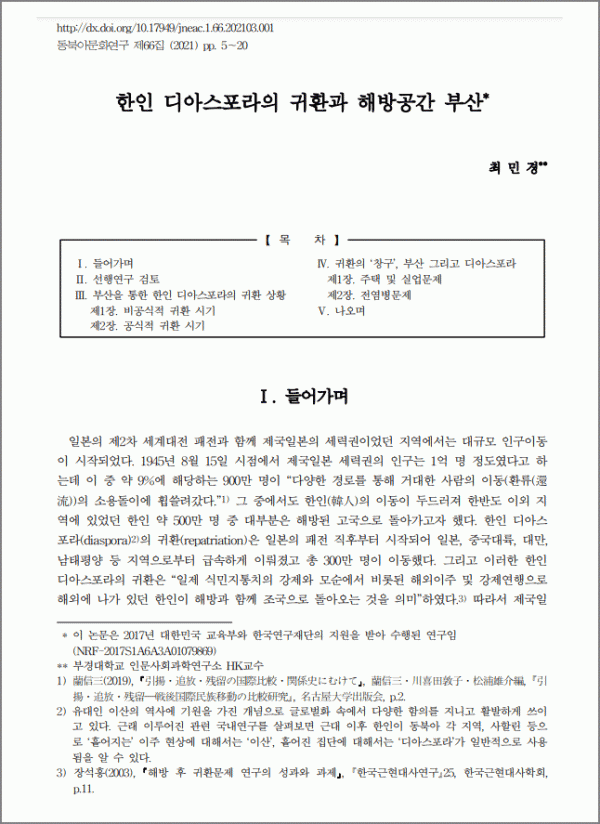첨부파일
-
 한인 디아스포라의 귀환과 해방공간 부산.pdf
(454.2K)
15회 다운로드
DATE : 2021-05-25 14:13:09
한인 디아스포라의 귀환과 해방공간 부산.pdf
(454.2K)
15회 다운로드
DATE : 2021-05-25 14:13:09
본문
The purpose of this study is to examine the diversity of perceptions about repatriation from the perspective of a local community by examining the specific situation of the Korean diaspora's repatriation and the impact of their repatriation on Busan during the post-liberation period.During the post-liberation period unique perception on repatriation and repatriates was formed in Busan, a gateway of repatriation. Since August 1945, more than 2 million Korean diaspora had repatriated to Busan from Japan, mainland China, and Taiwan in a short period of time. From the perspective of the local community of Busan, this meant a large influx of population, and various social problems derived from this movement had an effect on the gaze on repatriation and repatriates. Representative social problems arising from the influx of repatriates were housing shortages, unemployment and infectious disease. In local community of Busan, as confronting and responding to these problems, a ambivalent awareness of the repatriated Korean diaspora was created. Regarding the shortage of housing and unemployment, sympathy turned to the repatriates, although repatriation brought social confusion. However, in the face of the spread of the infectious disease, negative perceptions, in particular anxiety and fear, became more intense, and interestingly, it was prominent toward repatriates from a specific region.
Like this when analyzed at the local level, the repatriation of the Korean diaspora was not a legitimate issue as a national task, and gazes on it showed complex aspects due to various social factors.
Post-LiberatThe purpose of this study is to examine the diversity of perceptions about repatriation from the perspective of a local community by examining the specific situation of the Korean diaspora's repatriation and the impact of their repatriation on Busan during the post-liberation period.
During the post-liberation period unique perception on repatriation and repatriates was formed in Busan, a gateway of repatriation. Since August 1945, more than 2 million Korean diaspora had repatriated to Busan from Japan, mainland China, and Taiwan in a short period of time. From the perspective of the local community of Busan, this meant a large influx of population, and various social problems derived from this movement had an effect on the gaze on repatriation and repatriates. Representative social problems arising from the influx of repatriates were housing shortages, unemployment and infectious disease. In local community of Busan, as confronting and responding to these problems, a ambivalent awareness of the repatriated Korean diaspora was created. Regarding the shortage of housing and unemployment, sympathy turned to the repatriates, although repatriation brought social confusion. However, in the face of the spread of the infectious disease, negative perceptions, in particular anxiety and fear, became more intense, and interestingly, it was prominent toward repatriates from a specific region.
Like this when analyzed at the local level, the repatriation of the Korean diaspora was not a legitimate issue as a national task, and gazes on it showed complex aspects due to various social factors.ion Period, Busan, Korean Diaspora, Repatriation, Social Problems







